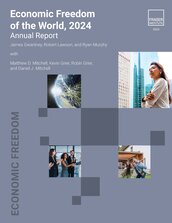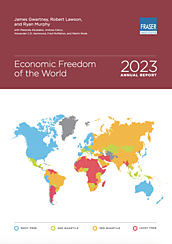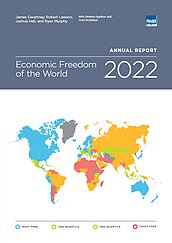The United States has slipped to 6th place in 2018 after having ranked 5th in the previous two years. The rankings of other large economies in this year’s index are Japan (20th), Germany (21st), Italy (51st), France (58th), Mexico (68th), Russia (89th), India (105th), Brazil (105th), and China (124th). The ten lowest‐rated countries are: the Central African Republic, Democratic Republic of Congo, Zimbabwe, Republic of Congo, Algeria, Iran, Angola, Libya, Sudan, and, lastly, Venezuela.
Nations in the top quartile of economic freedom had an average per capita GDP of US$44,198 in 2018, compared to $5,754 for bottom quartile nations. Moreover, the average income of the poorest 10% in the most economically free nations is more than twice the average per capita income in the least free nations. Life expectancy is 80.3 years in the top quartile compared to 65.6 years in the bottom quartile.
This year’s report includes a chapter by Niclas Berggren and Therese Nilsson on how economic freedom generates social trust and tolerance.
The first Economic Freedom of the World Report, published in 1996, was the result of a decade of research by a team which included several Nobel Laureates and over 60 other leading scholars in a broad range of fields, from economics to political science, and from law to philosophy. This is the 24th edition of Economic Freedom of the World and this year’s publication ranks 162 countries and territories for 2018, the most recent year for which data are available.




